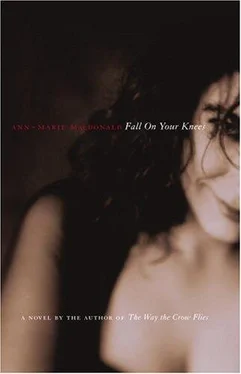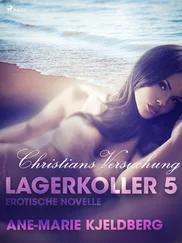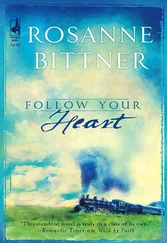But Materia will look pregnant from now on. People will always assume she’s six or seven months. This will come in handy.
James joins the 94th Victoria Regiment Argyll Highlanders. His captain speaks Gaelic, as does eighty per cent of the unit. James volunteers immediately for overseas duty, glad of any training that gets him away from home. Bayonet fighting at the Wellington Barracks in Halifax: rushing at bags bleeding sand, “under and up, ladies, under and up! You’re caught in his ribcage!” A British sergeant teaches them how to dig immaculate trenches, neatly sandbagged: “Not too deep, lads, we ain’t stopping long!” — just long enough for a bit of a kip, then it’s over the top with the Hun on the run. James is among the older men there. He doesn’t fraternize, he doesn’t care about King George nor does he have anything against the Kaiser. He counts the days till he’s overseas. “Under and up, ladies, under and up!”
Fifty years of European peace have generated exuberance on all sides. A lot of horses stand ready to gallop across Europe in two directions. Cape Breton has joined up in droves, despite the fact that over the past twenty-five years the Canadian army has spent more time guarding the property of the Dominion Coal Company than it has fighting. But the recruiters have been eloquent — “poor little Belgium, the blood-thirsty Boche” — the mines have been slow and what boy doesn’t long to be a soldier? The fact that friends will get to serve side by side is also very persuasive — whole towns in the same stretch of trench. Everyone is afraid that “she’ll be all over by Christmas”. James hopes the war will last two years. That way Kathleen will be old enough to leave home when he returns. If he returns.
James finishes basic training and takes up home defence duties. All through the fall, he and the rest of the 94th patrol the coast in a state of frustrated suspense, terribly worried lest the war should end before they get over there. They become known as the blueberry soldiers, because there’s not a lot else for them to do besides pick blueberries and keep their eyes peeled for a German ghost ship. James eats at home, but sleeps with two other soldiers in a shack on the beach at Lingan. Ready, Aye, Ready.
Eventually, James is transferred to the Cape Breton Highlanders 85th Overseas Battalion of the Canadian Expeditionary Force. He is issued a Ross rifle. It’s a good thing there’s a knife attached to its barrel — no one knows yet just how far the Ross rifle’s efficiency in a field of North American rabbits outstrips its performance in European mud. Along with sixty-five pounds of kit, James is also issued a khaki tunic, a leather battle kilt, a blond and black horsehair sporran, a dress kilt of bright Macdonald tartan and a beret with a red tassel. The Germans will be sure to see him coming. And with the regimental pipers first over the top, the Germans will be sure to hear them. Bagpipes have a liquefying effect on the bowels of the enemy, and bare knees in battle strike the fear of the fanatical. The Germans will come to call the Highland regiments “die Damen von Hölle” — the ladies from hell.
Finally, one day in December 1914, James stands in the drive while Taylor heaves his duffel bag into the buggy waiting to take him to the docks in Sydney. It’s snowing and James feels the unaccustomed bite of winter on his knees. He knows he is in the proud dress of his ancestors but he sorely misses his trousers. Materia can’t help but think how handsome he looks. James pats them all on the head. Frances tickles his knee, Mercedes offers him her soggy cookie, Kathleen throws her arms around him, can’t stop herself crying, she never cries, she’s not a sissy. She clings, he tries to disengage.
“Be a good soldier now, look after your mother.”
“No!”
“That’s enough now, shshsh….”
But she runs to the house, ramming open the door — Daddy, my daddy is going away, he might be killed, or drowned before he even gets there — up the stairs two at a time — and he’s leaving me here with this horrible woman! Into her room, avoiding the mirror, slamming the door, locking it.
“G’bye fellas, say a prayer for your old dad.”
He knows Materia will pray, she’ll pray her fool head off.
He’s right, she does. She prays so hard that her head really does seem to get a little wobbly. She prays he’ll be killed quickly and painlessly in Flanders.
With James gone, Materia comes to life. She takes pleasure in her little ones — Mercedes is such a good girl and Frances is a clown. Kathleen keeps up a life of her own, staying late at school to train with Sister Saint Cecilia or to practise with the choir, solos of course. When she’s home she’s impossible, but at least she’s out of harm’s way, inshallah .
What to feed her is a constant conundrum. Nothing satisfies. She rolls her eyes, sighs ostentatiously, flounces from the room. Materia falls back on James’s old standby of toasted cheese, slicing it daintily into four, placing it before her, “SaHteyn .”
“Mother! English, please.”
Kathleen, Mercedes and Frances share the impression that their mother doesn’t speak much English. This didn’t used to be true, but it has come somewhat to pass simply because Materia doesn’t speak English much. For with whom would she converse in English? Not her husband. And Mrs Luvovitz has always been mercifully undemanding of Materia in that regard, their friendship having revolved around food, children, the old Yiddish songbook. Materia has been content just to sit at Mrs Luvovitz’s kitchen table and listen to the older woman hold forth on what’s what.
Prepositions were the first to fall away, then adverbs crumbled, along with whole clauses, until Materia was left with only the most stolid verbs and nouns.
The difference between Kathleen and the younger girls is that Materia speaks plenty with Mercedes and Frances — although she has lost some of her mother tongue too, through disuse, all but the indelible language of her own earliest memories. Thus Materia and her two younger daughters speak the Arabic of children — of food, endearments and story-telling. Ya aa’yni, te’berine .
Mercedes and Frances understand that Arabic is something just between them and Mumma. There are many Arabic-speakers in Cape Breton by now, but the little sisters think they and their mother are the only ones, outside the mysterious population of that far-off place called the Old Country. A place better than any on earth, but a place you are nonetheless lucky to have escaped,
“Why?”
“Because of the Turks.”
“Oh.”
A place where everyone speaks the Piper girls’ private at-home language right out in the open, and everyone looks like their mother.
“Tell us about the Old Country again, Mumma.”
On the kitchen cot, before Kathleen gets home, they sink into Materia’s soft body, which provides a pillow for each head, her plushy smell of fresh wet bread and oil, a pot of bezzella and roz with lamb on the stove, the lid buzzing sleepily. Outside, the winter drizzle blurs the window.
“Lebanon is the most beautiful place in the world. There are gentle breezes, it’s always warm there. The buildings are white, they sparkle in the sun like diamonds and the sea is crystal-blue. Lebanon is the Pearl of the Orient. And Beirut, where I was born, is the Paris of the Middle East.”
“Can we go live there?”
“No.” You were lucky to be born on this damp grey rock in the Atlantic, beautiful in its own mournful way.
“Because of the Turks?”
“Yes.”
This island, familiar to famished Irish and gnarly-kneed Scots who had been replaced by sheep in their Old Country.
Читать дальше












